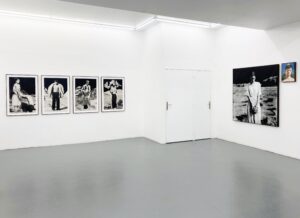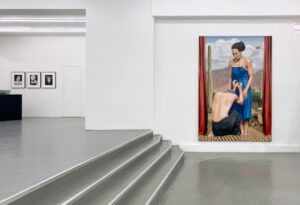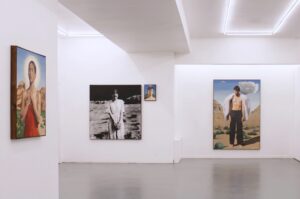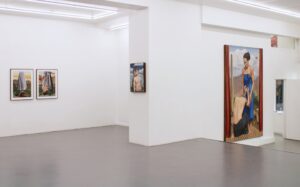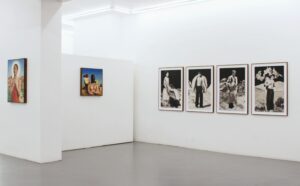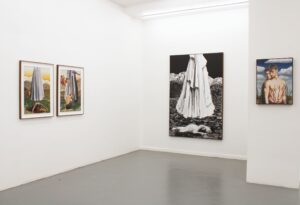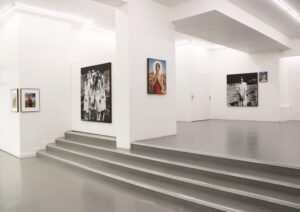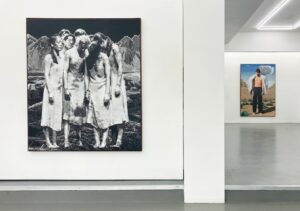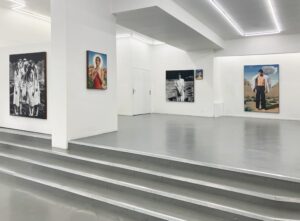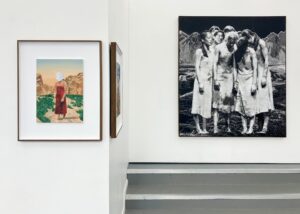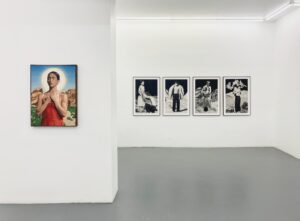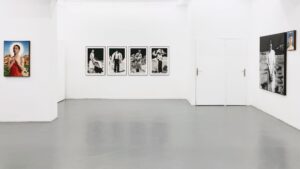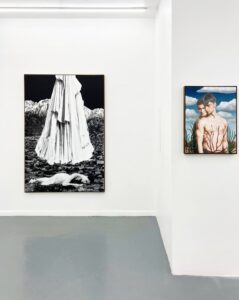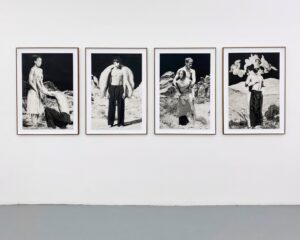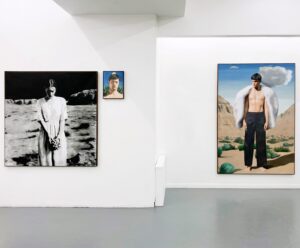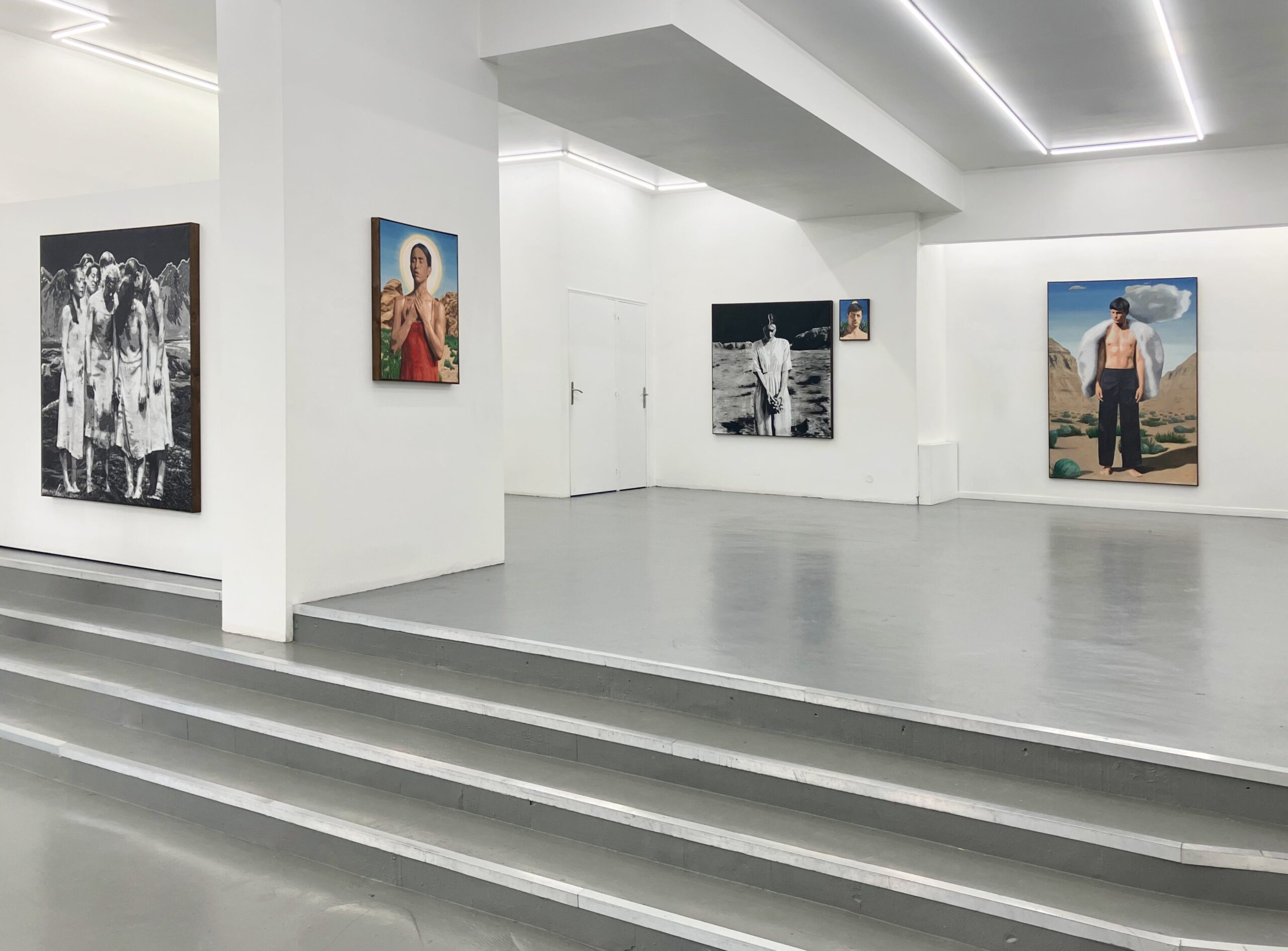Julien Delagrange
Rites Oubliés
March 9 — April 6, 2024
Galerie Sabine Bayasli
99 Rue du Temple
Paris, France
Galerie Sabine Bayasli is pleased to present Forgotten Rites, a second solo exhibition by Julien Delagrange at the gallery. On this occasion, the Belgian artist presents a new series of oil paintings and charcoal drawings—both on canvas and on paper—reflecting on the power and conflict of our often-forgotten primitive nature, urges, and desires.
Julien Delagrange (born in 1994 in Kortrijk, Belgium, resides and works in Harelbeke, Belgium) is best known for his black and white charcoal drawings, executed in an utmost personal and recognizable technique, building the image with various thin layers of charcoal dust, and his vibrant oil paintings using historical painterly conventions in a post-conceptual manner. Human figures populate surreal scenery, marked by an existential atmosphere. Delagrange is interested in the human condition from an anthropological perspective. If we strip away our clothes, societal constructs, daily activities, and accumulated knowledge resulting in science and prosperity, can we rediscover what and who we really are? Are we still able to remember our nature, to feel it, or perhaps even to align and make peace with it? Or do we continue to fight and suppress our—often irrational—urges, leaving us alienated?
As a result, a recurring theme throughout his practice is the discrepancy between our primitive human nature and our expected behavior and thoughts in a highly technological and rapidly changing world, resulting in imminent conflict. For instance, in the ongoing series titled Metaphysical Weight, the use of heavy drapery symbolizes the ubiquitous metaphysical conflict and burden of our existence, resulting in spirituality, religion, or the afterlife, rites, relics, funerary practices, monuments, and the overall urge for something supernatural to make our suffering, grief, and meaninglessness bearable and livable; concepts that have no place in a secular and rational world. An internal conflict touching the most profound traces of our human nature. In the series We Are All Martyrs, we encounter a syncretic presentation of this collective suffering and loneliness and how we find solace and meaning in beauty, ecstasy, and the transcendent. A notion that became most clear in the appropriation and homage of Pina Bausch’s choreography of The Rite of Spring—an utmost important influence that is visible throughout his artistic practice. In The Victory of Icarus, we revisit the ancient story of Icarus, constructed to warn us from Hubris. However, in this case, we encounter the triumph of Icarus’ curiosity instead of the oppression of curiosity. By doing so, Julien Delagrange provides metaphors and analogies to remind us what we are via fictional and syncretic forgotten rites, aiming to liberate us—and perhaps, in the first place, himself—from rationalizing what we feel instead of embracing it.
Julien Delagrange was trained as an art historian, having graduated (magna cum laude) with his MA in Science of Arts at Ghent University, Belgium, resulting in an artistic practice that is strongly intertwined with his activities as a writer and curator. Delagrange has worked for the Centre for Fine Arts in Brussels, Belgium; the University Library in Ghent, Belgium; and the Jan Vercruysse Foundation in Brussels, Belgium. He is the editor-in-chief of the hybrid art platform Contemporary Art Issue and has contributed as a freelancer to various exhibition catalogs, magazines, galleries, and educational programs as an art critic, guest lecturer, or jury member—actively contributing to the debate of contemporary art both as an artist and thinker. Delagrange is represented by Galerie Sabine Bayasli in Paris, France, and Space60 in Antwerp, Belgium. His works feature in various international private collections, encompassing the Smith Collection in Australia and the Mennuni Collection in Switzerland. Notable exhibitions include the solo presentations Human Preservation (2021) at Verduyn Gallery in Moregem, Belgium; Dark Matter (2022) at Space60 in Antwerp, Belgium; Les Images de Rêves (2022) at Galerie Sabine Bayasli in Paris, France; and the inclusion in group exhibitions at D Space (2019) in Den Haag, the Netherlands; Külhaus (2020) in Berlin, Germany; Galerie A.B. (2021) in Roeselare, Belgium; Micksart (2021) in Emmen, the Netherlands; among others.
Essay by Sylvia Walker
